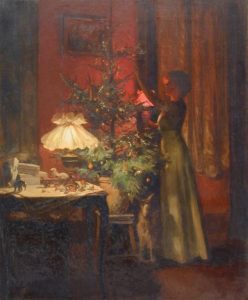“You are not to plant any sort of tree as a sacred pole beside the altar of Adonai your God that you will make for yourselves.”-Deuteronomy 16:21
From verse 21, the Lord calls out those unacceptable religious practices that although universally practiced, Israel is to avoid.
In fact, the government authorities themselves are to be the first ones to come forward and be ruthless in stamping out these practices.
The first forbidden practice listed is that Israel is not to set up a sacred post or any type of pole next to the altar of HASHEM Almighty.
The Hebrew word used for pole here is ASHERAH.
What does this word mean exactly?
It refers to any kind of wooden pole, tree, or tree-like object dedicated to a god.
The heathen didn’t actually think these poles were really gods or goddesses but they were considered powerful symbols that were erected in honor of the many gods they worshipped.
For the Canaanites, the two main gods they worshipped were BAAL and ASHTORETH.
It was in honor of these Gods that the Canaanites erected fir trees and wooden poles.
Historically speaking, the majority of the poles erected were dedicated to ASHTORETH which was the Canaanite goddess of fertility.
In the next verse, the Lord calls out the object the Canaanites used the most to honor their chief god, BAAL.
I’m talking about stone pillars which is often referred to in Scripture as a “standing stone”.
So that’s how it was long before Israel arrived on the scene.
Fir trees and poles were dedicated to the fertility goddess ASHTORETH and…
…stone pillars were used as a form of a standing altar or shrine built to honor the male god BAAL.
And in case you were wondering, according to Canaanite religious lore, the goddess ASHTORETH was the wife of BAAL.
So for obvious reasons, God makes it clear to Israel that they are not to even think setting up a tree, pole or standing stone next to His Holy Altar.
Why?
Because God doesn’t in anyway want His Holiness and Character to be associated with objects symbolic of the gods of the Canaanites.
It was a common practice in those days for a nation after conquering another nation to simply reuse the already erected sacred places.
To this, the Lord is saying NO WAY JOSE!
You are not reuse an object that has previously been dedicated to other gods.
This is actually why we’ll encounter many laws in Scripture that at first glance don’t really seem to be so bad.
For example, take the prohibition of cooking a goat kid in it’s mother’s milk.
Such an action was actually a Canaanite worship practice.
Therefore, it was outlawed as the Lord didn’t want worship of Him to be mixed with worship practices of the pagans which actually leads me to my next point.
What about Christmas trees?
In light of this command that we just studied, would it be okay for one who calls himself a worshipper of the God of Israel to erect a Christmas tree in his home?
What do you think?
According to the Encyclopedia Britannica…
“The use of evergreen trees, wreaths, and garlands to symbolize eternal life was a custom of the ancient Egyptians, Chinese, and Hebrews. Tree worship was common among the pagan Europeans and survived their conversion to Christianity in the Scandinavian customs of decorating the house and barn with evergreens at the New Year to scare away the devil and of setting up a tree for the birds during Christmas time.”
I find it interesting that in spite of the command we just studied, the Hebrews are listed along with the pagan Egyptians and Chinese as those who used evergreen trees as symbols of fertility.
Obviously, it just means that in ancient times they were seduced by the ways of the world like we all are today and succumbed to the pressure of doing things the way the pagans did.
Nevertheless, in light of the command we just studied, I think it’s clear that any one who would call himself a follower of the God of Israel should absolutely NOT set up a Christmas tree in his or her home.




Symbolism is one thing and diety worship is another. It is the person that gives the object its meaning, not the other way around. Christmas trees don’t really align with any known pagan practices and are not worshiped in their own right, that is because one doesn’t think for a minute that Yeshua will answer through the tree, nor does anyone try communing with the tree itself. Rather it is a celebration of the first coming of the Messiah.
Read the Book of Judges.
I find it interesting that Hanukkah and Purim are special events celebrated in response to actions committed by enemies of Yah’s people, and of course no admonition is given to the continuation of those holidays.
But when the actions are committed by Yah on the Messiah’s part, any celebration in response is now called “pagan”?